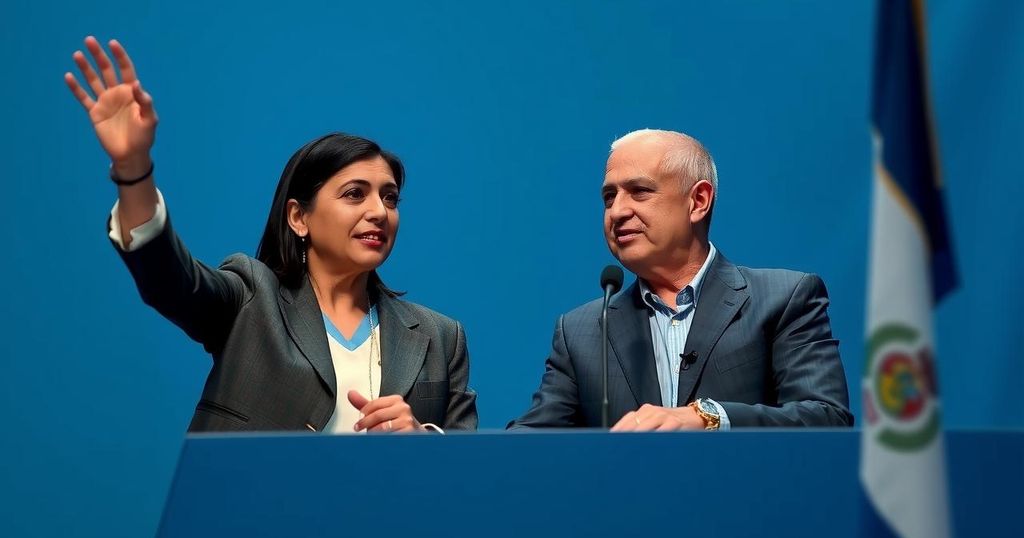Uruguay’s recent presidential election, marked by high turnout and two moderate candidates, reflects political stability amidst regional turmoil. Incumbent president’s coalition faced off against a center-left alliance in an election lacking the divisive rhetoric found in neighboring countries. The outcome is expected to maintain Uruguay’s status as a model democracy.
On a recent Sunday, Uruguay held a significant election where its citizens cast votes to select a new president in a contest marked by moderation amidst a backdrop of instability seen in other Latin American nations. Voter participation was notably high, exceeding 88 percent among the 2.7 million eligible individuals who also addressed parliamentary positions and a referendum aimed at reforming the social security system. The electoral atmosphere diverged sharply from that of neighboring countries such as Brazil and Argentina, characterized by divisive rhetoric and political turmoil. Instead, the campaign was comparatively low-key, with candidates from the ruling conservative coalition and the opposing center-left alliance displaying a shared commitment to stability. Political analyst Juan Cruz Díaz remarked on the sense of consensus in Uruguay, highlighting the contrast with turbulent electoral climates seen elsewhere in the region. The election was executed under compulsory voting laws, resulting in significant civic engagement. The leading candidates – Álvaro Delgado from the governing party and Yamandú Orsi of the Frente Amplio coalition – both agreed on essential policy issues, suggesting that no substantial shifts in governance would result from the election outcome. Delgado, who previously served as chief of staff under incumbent president Luis Lacalle Pou, expressed a sense of pride in the democratic process. In contrast, Orsi emphasized the importance of the voters’ ability to elect leaders, noting that Uruguay has enjoyed four decades of democratic prosperity since the end of military rule in 1984. While Orsi appeared to have a sizable lead in polling, it remained uncertain whether he would achieve a majority, leading to the possibility of a runoff vote later this month. Meanwhile, Andrés Ojeda, a candidate from a non-traditional background, sought to engage younger voters through a modern social media approach, though his influence in the election remained limited. Concerns regarding societal issues such as crime, poverty, and the rate of education were prevalent—as were fears regarding a pivotal referendum intended to revamp Uruguay’s social security framework. Though both leading candidates expressed reservations about the proposed changes, supporters argued that the initiative aimed to balance economic resources in a country where many citizens faced financial hardships.
Uruguay is known for its political stability and has been regarded as a model democracy within Latin America. The country has a long history of strong democratic values, restoring civilian rule in 1984 after a twelve-year dictatorship. In recent elections, candidates have predominantly aligned on critical issues, leading to minimal expectations for drastic policy changes during electoral contests. The current election stands as a notable event—contrasting sharply with trends in the region—by reflecting a culture of consensus rather than division. The high voter turnout illustrates Uruguayan citizens’ ongoing commitment to their democratic rights, even amidst broader concerns about social security amid growing economic challenges.
In conclusion, Uruguay’s recent presidential election displayed a distinct atmosphere of political moderation, emphasizing stability amid regional turbulence. With two main candidates largely aligned on key issues and the electorate demonstrating robust engagement, the results anticipated will likely reinforce Uruguay’s identity as a democratic bastion in a politically volatile region. The focus on social issues, alongside the contentious social security referendum, illustrates the complexity of the current political landscape in Uruguay, notwithstanding the underlying consensus exhibited during the campaign.
Original Source: www.pbs.org







